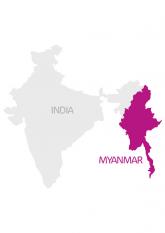
I will be based in the Kale Township, which is in the Sagaing Region in western Myanmar. The Sagaing region is one of the largest within Myanmar, and has a population of over six million people, most of whom live in remote areas. This region has a rainy season, which led to a devastating flash flood in 2015.
Myanmar is moving towards becoming a democratic state following decades of military rule, which has held back a lot of the country’s development. There has been serious under investment in public services for decades, which means health care has really suffered. In Myanmar there are currently 200 maternal deaths per 100,000 live births. This is a really shocking figure as it is 16 times the UK figure of 12 deaths per 100,000 births.
I will be working in one of the most rural areas of Myanmar, where there are very few skilled medical professionals. Heartbreakingly the Magway region accounts for 87% of the maternal deaths in the country, so this really must be changed to ensure mothers and babies do not die needlessly.
I will be sharing my skills and knowledge with the midwifery students at a government hospital where I will volunteer as a clinical midwifery tutor. Not only will I be aiding teaching I will also be a mentor-in-residence.
The main aims of my volunteering placement will be to support using evidence-based clinical care, reinforcing teaching practices, creating lesson plans and coaching and training midwives in the educational and clinical setting. The main challenge will be adapting my methods from the UK to work in a developing country with significantly less medical resources.
I will be working with both the teaching staff within the midwifery school and helping the students themselves with my experience as a nurse. The vast majority of teachers have only received basic midwifery training themselves through the government, so I will be ensuring I can get them up to speed with best practice. Rural regions account for 87% of the whole country’s maternal deaths, so ensuring the next generation of midwifes are well trained will be crucial to saving more mothers’ and babies’ lives in Myanmar.